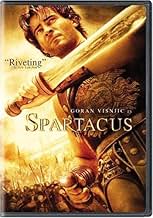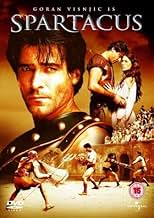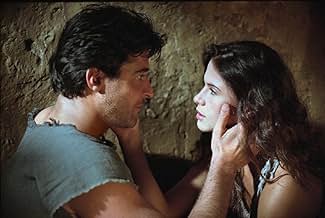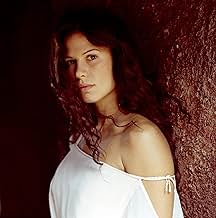VALUTAZIONE IMDb
6,6/10
5911
LA TUA VALUTAZIONE
Aggiungi una trama nella tua linguaAfter he is bought by the owner of a Roman gladiator school and trained as a gladiator, a slave leads a rebellion of slaves and gladiators into revolt against Rome.After he is bought by the owner of a Roman gladiator school and trained as a gladiator, a slave leads a rebellion of slaves and gladiators into revolt against Rome.After he is bought by the owner of a Roman gladiator school and trained as a gladiator, a slave leads a rebellion of slaves and gladiators into revolt against Rome.
- Candidato a 1 Primetime Emmy
- 1 vittoria e 7 candidature totali
Sfoglia gli episodi
Recensioni in evidenza
The 1960 version of Spartacus remains one of the best historical epics ever made but this new film rates very well beside it. It is more historically accurate and much more faithful to the original Howard Fast novel on which both films were based.
All the actors did a good job. Goran Visnvjic was an effective Spartacus and Rhona Mitra a feisty Varinia very much in keeping with the book. Alan Bates is at his best in the role of a senator playing a behind the scenes role in trying to stop Crassus in his drive for power over the Roman state. I was least impressed by Angas Macfadyen in the role of Crassus although it's still a competent performance. I guess that Lawrence Olivier who played Crassus in the 1960 movie is a hard act to follow.
The battle scenes are competently performed but the armies look much smaller than the historical record said they were. I guess the original Spartacus had more money to spend on extras. A long standing wish of mine is for a Roman epic to get the armor right. The Roman soldier of this period wore short mail shirts and used oval shields. The segmented armor wasn't introduced until about a century later.
I couldn't fault the history. Everything seems to be done right, from the first battle when the slaves abseiled down the cliffs of Vesuvius to attack the Roman camp to the splitting up of the slave army when Crixus and Spartacus had a falling out. The gladiator scenes are just as good as the original too.
All in all, a great movie that even die-hard fans of the Kirk Douglas version should enjoy.
All the actors did a good job. Goran Visnvjic was an effective Spartacus and Rhona Mitra a feisty Varinia very much in keeping with the book. Alan Bates is at his best in the role of a senator playing a behind the scenes role in trying to stop Crassus in his drive for power over the Roman state. I was least impressed by Angas Macfadyen in the role of Crassus although it's still a competent performance. I guess that Lawrence Olivier who played Crassus in the 1960 movie is a hard act to follow.
The battle scenes are competently performed but the armies look much smaller than the historical record said they were. I guess the original Spartacus had more money to spend on extras. A long standing wish of mine is for a Roman epic to get the armor right. The Roman soldier of this period wore short mail shirts and used oval shields. The segmented armor wasn't introduced until about a century later.
I couldn't fault the history. Everything seems to be done right, from the first battle when the slaves abseiled down the cliffs of Vesuvius to attack the Roman camp to the splitting up of the slave army when Crixus and Spartacus had a falling out. The gladiator scenes are just as good as the original too.
All in all, a great movie that even die-hard fans of the Kirk Douglas version should enjoy.
There's some confusion about this Spartacus miniseries and the 1960 epic movie Spartacus. The stories are very similar because they both use the Howard Fast novel as a basis. The Kirk Douglas movie had another mission though as it was one of a group of movies made to regain the public's interest in the cinema with lavish spectacle. The scale of its production is much higher than the miniseries. What the miniseries has going for it is more historical accuracy; the gladiator/rebel army marched up Italy, got to the Alps and changed its mind (very puzzling), marched down to Italy's toe hoping to escape by boat but was foiled and was trapped for a time. They broke out only to quarrel amongst themselves and break up into at least two groups. This proved their undoing as the Romans first massacred the smaller group of Gauls and then defeated Spartacus in turn. Spartacus' body was never identified, but many were crucified along the road all the way to Rome. Spartacus and his army made the Romans pay in much blood and defeat leading up to his and their ultimate defeat, though, requiring 15 or 16 legions to chase them down. Spartacus is a favorite hero of the Communists, BTW, being the working stiff rising up against the ruling class, etc...
The 1960 epic is short on accuracy, instead showing the rebel army defeating the garrison of Rome and another legion or 3 along the way to Brundusium, only to turn back and get overwhelmed by multiple Roman armies. It was a closer match to the actual scale of events, as the rebels numbered around 90-100,000. But they both have the same love story tacked on along with treachery in the Roman Senate by ahistorical Roman Senators, and a Crassus obsessed with possessing the strength of Spartacus by possesing his woman.
The 1960 remains my favorite version simply because its a well-done big movie (I wouldn't want to be the one to reprise Olivier's Crassus!)although it was good to see a more accurate portrayal of the course of events shown in the miniseries. The acting was pretty good, with Spartacus' Visnjic a good choice for the title role.
The 1960 epic is short on accuracy, instead showing the rebel army defeating the garrison of Rome and another legion or 3 along the way to Brundusium, only to turn back and get overwhelmed by multiple Roman armies. It was a closer match to the actual scale of events, as the rebels numbered around 90-100,000. But they both have the same love story tacked on along with treachery in the Roman Senate by ahistorical Roman Senators, and a Crassus obsessed with possessing the strength of Spartacus by possesing his woman.
The 1960 remains my favorite version simply because its a well-done big movie (I wouldn't want to be the one to reprise Olivier's Crassus!)although it was good to see a more accurate portrayal of the course of events shown in the miniseries. The acting was pretty good, with Spartacus' Visnjic a good choice for the title role.
The novel by Howard Fast deservedly works as a source for the story of Spartacus on the screen. However, it got considerably condensed in the 1960 classic Kubrick/Douglas production due to some specific limitations/requirements in the Hollywood of that time. This resulted in a fabulous motion picture, a cult Roman epic, the last great production of the period; yet, that is the movie which, for more than half a century, has stood on its own as a more independent production rather than a good novel adaptation. Therefore, the idea to make something more faithful to Fast's bestseller occurred reasonable after all these years when Ridley Scott's GLADIATOR marked a new rise of ancient epics. Robert Dornhelm's SPARTACUS is no remake, which makes all comparisons fruitless but its great challenge of adapting the novel to the modern expectations leaves many factors open for analysis. Does it succeed in that respect? Does it make us keen on the novel?
Dornhelm's interpretation of the story, being merely a TV production, appears to surprise both the novel buffs and the epic freaks. SPARTACUS succeeds at two major levels.
First, this production maintains the core idea of what the entire story is about. Having read Fast's novel, most people agree that the content of the movie strongly resembles the ideals and events therein incorporated. Our attention is focused on various personalities, various lives that meet at one significant moment: their mutual fight for freedom. The slaves (no human rank within the Roman society) are at the core, the slaves are the 'heroes.' Therefore, at the very beginning when Varinia and Spartacus are equally introduced to us, we feel the very spirit that is so unique in the novel: human stories, simple stories with no king, no hero. That ideal is, of course, contrasted with the Roman world, the world of corruption, greed and self-admiration. The world of hierarchy vs the world of equality. Consider the Roman leaders talking of sunrises vs sunsets. While the world of slaves represents many fights but one goal, the world of Romans represents individual ends and means justified. The events that shook the politicians and ambitious masters reflected upon at the Villa Salaria in Fast's novel (an important location for the novel not mentioned here) truly contribute to the spirit of the entire theme. The faithfulness to the novel is expressed in the development of characters, including Spartacus and certain aspects in scenes like the 'soul' blowing between Varinia and Spartacus, the true reason for the revolt in Batiatus' school at Capua, the ill ambitions of 'noble' Marcus Crassus, finally, the rescue of Varinia and the baby. And that beautifully addresses the novel buffs.
Second, unlike the novel built upon flashbacks (beginning with the actual crucifixions of slaves and young adventure seekers' journey for Capua), the linear content in Dornhelm's SPARTACUS better resembles the spirit and manner of epic productions. The events clearly develop to certain climaxes; the battles are realistic; the gladiatorial fights are enriched with concrete 'ornaments' which, not necessarily historical, rouse viewers' interests. Deeper analysts will be particularly keen on the depiction of Draba's death...far and close to the novel similarly to the 1960 version. The convincing adaptation addresses the merits of the movie like wardrobe, locations, graphic violence (respectfully handled), sets, and... performances.
Goran Visnijic, to a great extent, emphasizes Spartacus' humanity. He is more the 'leader with the broken nose' described in the novel, he focuses on human nature of his character including his own weaknesses. He has little of a great superhero's features - Visnijic's Spartacus is sympathetic, he does not distort the image that was incorporated in the novel – a good husband, a good gladiator and a good 'father' for his peoples. Sir Alan Bates (who actually died during the production) is another key character here. His role of Agrippa refers to the role of Charles Laughton's Gracchus and, similarly to the novel character Gracchus. He represents the different face of Rome – although his ways up the ladder were also deceptive, he is the politician who can face and accept the truth no matter how bitter it is. That makes Agrippa a good Roman...that made Gracchus a good Roman. Finally, the character portrayal that needs more attention is...Rhona Mitra's Varinia – something revolutionary! There is nothing about her that makes you think of Jean Simmons but Ms Mitra is indeed closer to the Varinia described by Howard Fast – a simple girl from Gaul, an emotional girl, a 'savage' girl that makes the proud Roman leader beg her for her love and a Roman senator say "You shame us."
All those facts, however, do not justify Robert Dornhelm's SPARTACUS for its flaws that appear to be striking at certain moments. First, it refers to the character of Draba and the viewers of Draba vs Spartacus fight – the key character and the key moment in the whole story. Draba teaches them how to live, he is a hero for the gladiators in the novel. They were selected to fight to the death by two Roman men who wanted to rouse themselves while seeing naked men fighting and dying in arena. One of them was Crassus...I think that this decadent debauchery should be emphasized more because it constitutes a certain basis for later struggles within Crassus' mind. I can understand that it was changed dramatically in 1960 due to the censors but in 2004 Mr Dornhelm could have considered that aspect of homosexuality. Another simplification is the weak development of David, the Jew.
All in all, a decent novel adaptation, one of the TV productions that has really succeeded at multiple levels to address the very gist of the story. After the ancient Appian Way filled with crosses, the highly optimistic finale follows and beautifully resembles the never ending dream of humanity: dream to be as simple as a child, as free as a child. That's what never dies, that's what is written in stars...
Dornhelm's interpretation of the story, being merely a TV production, appears to surprise both the novel buffs and the epic freaks. SPARTACUS succeeds at two major levels.
First, this production maintains the core idea of what the entire story is about. Having read Fast's novel, most people agree that the content of the movie strongly resembles the ideals and events therein incorporated. Our attention is focused on various personalities, various lives that meet at one significant moment: their mutual fight for freedom. The slaves (no human rank within the Roman society) are at the core, the slaves are the 'heroes.' Therefore, at the very beginning when Varinia and Spartacus are equally introduced to us, we feel the very spirit that is so unique in the novel: human stories, simple stories with no king, no hero. That ideal is, of course, contrasted with the Roman world, the world of corruption, greed and self-admiration. The world of hierarchy vs the world of equality. Consider the Roman leaders talking of sunrises vs sunsets. While the world of slaves represents many fights but one goal, the world of Romans represents individual ends and means justified. The events that shook the politicians and ambitious masters reflected upon at the Villa Salaria in Fast's novel (an important location for the novel not mentioned here) truly contribute to the spirit of the entire theme. The faithfulness to the novel is expressed in the development of characters, including Spartacus and certain aspects in scenes like the 'soul' blowing between Varinia and Spartacus, the true reason for the revolt in Batiatus' school at Capua, the ill ambitions of 'noble' Marcus Crassus, finally, the rescue of Varinia and the baby. And that beautifully addresses the novel buffs.
Second, unlike the novel built upon flashbacks (beginning with the actual crucifixions of slaves and young adventure seekers' journey for Capua), the linear content in Dornhelm's SPARTACUS better resembles the spirit and manner of epic productions. The events clearly develop to certain climaxes; the battles are realistic; the gladiatorial fights are enriched with concrete 'ornaments' which, not necessarily historical, rouse viewers' interests. Deeper analysts will be particularly keen on the depiction of Draba's death...far and close to the novel similarly to the 1960 version. The convincing adaptation addresses the merits of the movie like wardrobe, locations, graphic violence (respectfully handled), sets, and... performances.
Goran Visnijic, to a great extent, emphasizes Spartacus' humanity. He is more the 'leader with the broken nose' described in the novel, he focuses on human nature of his character including his own weaknesses. He has little of a great superhero's features - Visnijic's Spartacus is sympathetic, he does not distort the image that was incorporated in the novel – a good husband, a good gladiator and a good 'father' for his peoples. Sir Alan Bates (who actually died during the production) is another key character here. His role of Agrippa refers to the role of Charles Laughton's Gracchus and, similarly to the novel character Gracchus. He represents the different face of Rome – although his ways up the ladder were also deceptive, he is the politician who can face and accept the truth no matter how bitter it is. That makes Agrippa a good Roman...that made Gracchus a good Roman. Finally, the character portrayal that needs more attention is...Rhona Mitra's Varinia – something revolutionary! There is nothing about her that makes you think of Jean Simmons but Ms Mitra is indeed closer to the Varinia described by Howard Fast – a simple girl from Gaul, an emotional girl, a 'savage' girl that makes the proud Roman leader beg her for her love and a Roman senator say "You shame us."
All those facts, however, do not justify Robert Dornhelm's SPARTACUS for its flaws that appear to be striking at certain moments. First, it refers to the character of Draba and the viewers of Draba vs Spartacus fight – the key character and the key moment in the whole story. Draba teaches them how to live, he is a hero for the gladiators in the novel. They were selected to fight to the death by two Roman men who wanted to rouse themselves while seeing naked men fighting and dying in arena. One of them was Crassus...I think that this decadent debauchery should be emphasized more because it constitutes a certain basis for later struggles within Crassus' mind. I can understand that it was changed dramatically in 1960 due to the censors but in 2004 Mr Dornhelm could have considered that aspect of homosexuality. Another simplification is the weak development of David, the Jew.
All in all, a decent novel adaptation, one of the TV productions that has really succeeded at multiple levels to address the very gist of the story. After the ancient Appian Way filled with crosses, the highly optimistic finale follows and beautifully resembles the never ending dream of humanity: dream to be as simple as a child, as free as a child. That's what never dies, that's what is written in stars...
Goran Visnjic gave a very credible performance as Spartacus. Instead of the superhero-style portrayed by Kirk Douglas (which I happened to LOVE that movie), Goran added more depth to the character ... the strengths AND the weaknesses. I also liked how the show developed his skills as a gladiator by having him do some real fighting rather than how it was done in the original.
Crassus (played by Angus MacFadyen) was likewise very three-dimensional. It was a shame that the movie was only 2 hours long (4 hours if you count the commercials). Given more time, it would have been enjoyable to see more of Crassus's political maneuvering. If that character had been born in our century, he'd be king of our country by now.
And there were surprisingly strong performances by others in bit-parts, like George Calil as Pompey, Ben Cross as Glabrus, and Henry Simmons as Draba. You can see that they did their homework and put real work into their character developments.
All in all, I give it an '8'. I'd like to give it a higher score, but I thought that the fight scenes were less than spectacular. Add a few thousand more stand-ins and maybe it would have been more believable. But I just didn't get the sense of volume that should have been there.
Crassus (played by Angus MacFadyen) was likewise very three-dimensional. It was a shame that the movie was only 2 hours long (4 hours if you count the commercials). Given more time, it would have been enjoyable to see more of Crassus's political maneuvering. If that character had been born in our century, he'd be king of our country by now.
And there were surprisingly strong performances by others in bit-parts, like George Calil as Pompey, Ben Cross as Glabrus, and Henry Simmons as Draba. You can see that they did their homework and put real work into their character developments.
All in all, I give it an '8'. I'd like to give it a higher score, but I thought that the fight scenes were less than spectacular. Add a few thousand more stand-ins and maybe it would have been more believable. But I just didn't get the sense of volume that should have been there.
The TV miniseries opens in Gaul 72 B.C. where the Romans put an end to Varinia's world making her a slave
Meanwhile Spartacus (Goran Visnjic) is free from the hell of the gold mines of Egypt to be trained as gladiator in the establishment of Lentulus Batiatus (Ian McNeice).
Most of "Spartacus" contains many of the miniseries' best moments The operation of the gladiatorial school and its training program is impressive and expressive; the apprentice gladiators are treated like special animals, tutored to perform in the arena as spectator-sport-killers, and occasionally rewarded with a woman in their cells
In this degrading manner Spartacus meets Varinia (Rhona Mitra) and it is his love for her and his hatred for his captors that brings about his decision to escape and lead revolt
Particularly effective is the scene in which Marcus Crassus (Angus Macfadyen) and his bored entourage visit the establishment and request for a private showing at its best of a pair of Thracians Crassus wanted to see courage, passion, and above all finality
Spartacus is matched with the African Draba in a fight to the death, but Draba (maybe rather than live as a beast) chooses to die as a man, attacking his spectators
The scene summarizes the iniquity of the situation, the cruelty of bondage, and the subsequent uprising of gladiators in Capua becomes a triumph easy to understand
Director Robert Donrhelm did a decent job, carrying the grandeur and the decay of ancient Rome
Most of "Spartacus" contains many of the miniseries' best moments The operation of the gladiatorial school and its training program is impressive and expressive; the apprentice gladiators are treated like special animals, tutored to perform in the arena as spectator-sport-killers, and occasionally rewarded with a woman in their cells
In this degrading manner Spartacus meets Varinia (Rhona Mitra) and it is his love for her and his hatred for his captors that brings about his decision to escape and lead revolt
Particularly effective is the scene in which Marcus Crassus (Angus Macfadyen) and his bored entourage visit the establishment and request for a private showing at its best of a pair of Thracians Crassus wanted to see courage, passion, and above all finality
Spartacus is matched with the African Draba in a fight to the death, but Draba (maybe rather than live as a beast) chooses to die as a man, attacking his spectators
The scene summarizes the iniquity of the situation, the cruelty of bondage, and the subsequent uprising of gladiators in Capua becomes a triumph easy to understand
Director Robert Donrhelm did a decent job, carrying the grandeur and the decay of ancient Rome
Lo sapevi?
- QuizA noticeable piece of dramatic license has Spartacus' son born exactly at the moment Spartacus dies in battle. As Marcus Crassus and Pompey Magnus are proclaimed co-consuls, the announcer calls Rome an empire, when it was still a republic at the time.
- BlooperWhen Spartacus is about to cut Crixus's throat, the fillings in Crixus's mouth are visible.
- ConnessioniRemake of Spartacus (1960)
I più visti
Accedi per valutare e creare un elenco di titoli salvati per ottenere consigli personalizzati
- How many seasons does Spartacus have?Powered by Alexa
Dettagli
- Tempo di esecuzione1 ora 27 minuti
- Colore
- Proporzioni
- 1.78 : 1
Contribuisci a questa pagina
Suggerisci una modifica o aggiungi i contenuti mancanti




































